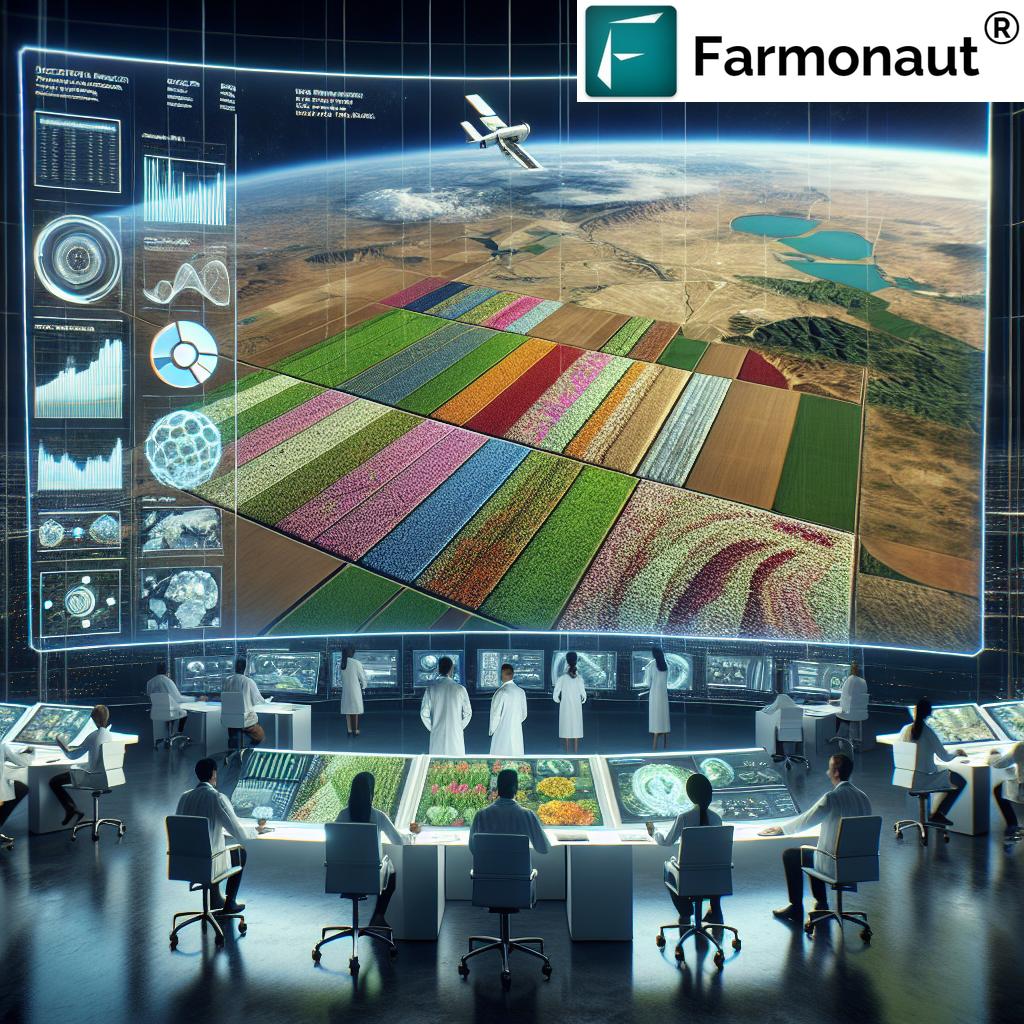Revolutionizing UK Defence: How Quantum Atomic Clocks Enhance Military Precision and GPS-Free Navigation
“Satellite crop monitoring can increase crop yields by up to 20% through optimized resource management and precision farming techniques.”
In an era where technology is reshaping every aspect of our lives, we’re witnessing a remarkable convergence of advanced innovations in both military and agricultural sectors. At Farmonaut, we’re at the forefront of precision agriculture technology, leveraging satellite crop monitoring and agricultural GPS systems to revolutionize farming practices. As we delve into the groundbreaking developments in UK defence, we’ll explore how these advancements parallel and complement the progress in smart farming solutions.
The Dawn of Quantum Atomic Clocks in UK Defence
The UK Ministry of Defence (MoD) has recently unveiled a groundbreaking achievement in the realm of quantum technology. The successful development of a state-of-the-art atomic clock at the Defence Science and Technology Laboratory (DSTL) marks a significant leap forward in military capabilities. This innovative device promises to enhance operational precision and reduce reliance on vulnerable GPS systems, mirroring the way our satellite-based farm management solutions at Farmonaut are transforming agricultural practices.

This UK-built atomic clock is a testament to the country’s commitment to innovation and technical excellence. With an unprecedented level of accuracy, losing less than one second over billions of years, it sets a new standard for precision timekeeping. The implications of this technology extend far beyond the military sphere, resonating with the precision we strive for in our agricultural data analytics and crop yield optimization tools.
Investing in the Future of Defence Technology
The MoD’s investment of over GBP 28 million in quantum technologies research and development underscores the government’s dedication to maintaining a technological edge in defence. This commitment to innovation mirrors our own efforts at Farmonaut to continuously improve our digital agriculture tools and remote sensing capabilities in agriculture.
The recent trial of the atomic clock outside laboratory settings represents a crucial milestone. It demonstrates the practical applicability of quantum technologies in real-world scenarios, much like how our field mapping technology brings laboratory-grade precision to farmers’ fields.
Addressing National Security Concerns
One of the primary drivers behind this technological advancement is the growing vulnerability of Global Navigation Satellite Systems (GNSS). The DSTL has identified this as a significant national security risk, emphasizing the need for alternative, sovereign-controlled timekeeping solutions. This concern parallels the challenges in agriculture that we address through our precision irrigation systems and crop monitoring techniques, ensuring resilience and reliability in farming operations.
The DATA Initiative: Exploring Quantum Clock Capabilities
The atomic clock trial is part of the broader Demonstration of Advanced Timing Apparatus (DATA) initiative. This series of experiments aims to explore the full potential of quantum clocks, with anticipated benefits for both military operations and national infrastructure resilience. Similarly, at Farmonaut, our ongoing research and development in agricultural GPS systems and smart farming solutions contribute to the resilience and efficiency of the agricultural sector.
“Advanced agricultural GPS systems can improve field mapping accuracy by 95%, enabling sub-meter precision for smart farming applications.”
Enhancing GPS Accuracy and Beyond
While the atomic clock technology promises to improve GPS accuracy significantly, its potential extends far beyond this application. From satellite communications to aircraft navigation, the implications are vast and varied. In the agricultural domain, we see similar wide-ranging impacts of our precision agriculture technology, from improving crop health monitoring to optimizing resource allocation across vast farming operations.

Key Advantages of Atomic Clock Technology in Defence
The MoD has highlighted several crucial advantages of the new atomic clock technology:
- Improved independent navigation systems, reducing reliance on vulnerable GPS satellites
- Enhanced secure communications systems dependent on synchronized timekeeping
- Increased accuracy and effectiveness of advanced weapon systems
- Operational edge in timing-critical situations, particularly in cyberspace
These advantages in the military sphere mirror the benefits we provide to farmers through our satellite crop monitoring and agricultural data analytics tools. Just as the atomic clock offers precision and reliability in defence operations, our solutions provide farmers with accurate, timely information for making critical decisions about their crops.
Collaborative Efforts in Quantum Technology Development
The successful trial of the atomic clock involved collaboration with key partners such as Infleqtion, Aquark Technologies, HCD Research, and Imperial College London. This collaborative approach in defence research echoes our philosophy at Farmonaut, where we work closely with agricultural experts and technological partners to develop and refine our smart farming solutions.
From Theory to Practice: The Royal Navy’s Perspective
Commander Matt Steele of the Royal Navy emphasized the significance of moving quantum technologies from theoretical concepts to practical applications. This transition is crucial for improving military effectiveness and resilience in the coming years. Similarly, in the agricultural sector, we at Farmonaut are constantly working to bridge the gap between cutting-edge research and practical, on-field applications of precision agriculture technology.
Parallels with Precision Agriculture
As we explore these groundbreaking developments in UK defence, it’s fascinating to observe the parallels with advancements in precision agriculture. At Farmonaut, we’re leveraging similar principles of precision and data-driven decision-making to revolutionize farming practices.
- Satellite Crop Monitoring: Just as the atomic clock provides precise timekeeping, our satellite-based monitoring systems offer accurate, real-time data on crop health and field conditions.
- Agricultural GPS Systems: The enhanced GPS accuracy promised by atomic clocks aligns with our high-precision GPS solutions for agriculture, enabling precise field mapping and targeted interventions.
- Remote Sensing in Agriculture: The quantum leap in sensing capabilities mirrors our use of remote sensing technologies to gather crucial agricultural data without physical contact.
- Smart Farming Solutions: The integration of advanced technologies in defence operations parallels our approach to smart farming, where we combine various technologies for optimized agricultural practices.
Explore our advanced agricultural solutions: Farmonaut Web App

The Future of Precision in Defence and Agriculture
As we look to the future, the potential applications of quantum technologies in both defence and agriculture are boundless. The precision and reliability offered by atomic clocks could revolutionize not just military operations but also various civilian applications. In agriculture, we anticipate similar transformative effects from the continued evolution of precision farming technologies.
At Farmonaut, we’re committed to staying at the forefront of these technological advancements, continuously improving our digital agriculture tools and crop yield optimization techniques. Our goal is to bring the same level of precision and reliability to farming that quantum technologies are bringing to defence.
Comparative Analysis: Quantum Atomic Clocks vs. Traditional GPS Systems
To better understand the revolutionary nature of quantum atomic clocks in military applications, let’s compare them with traditional GPS systems:
| Features | Quantum Atomic Clocks | Traditional GPS Systems |
|---|---|---|
| Precision | Nanosecond-level accuracy | Microsecond-level accuracy |
| Dependence on Satellite Signals | Independent | Dependent |
| Operational Range | Global, including indoor and underground | Limited in certain environments |
| Vulnerability to Jamming | Highly resistant | Vulnerable |
| Size/Portability | Potentially smaller and more portable | Varies, but generally larger systems |
This comparison highlights the significant advantages that quantum atomic clocks bring to military operations, particularly in terms of precision, independence, and resilience. These benefits align closely with the improvements we’re seeing in precision agriculture through advanced technologies.
The Role of AI in Enhancing Precision
While quantum atomic clocks represent a leap forward in precision timekeeping, the integration of Artificial Intelligence (AI) in both defence and agriculture is equally transformative. At Farmonaut, we leverage AI in our agricultural data analytics to provide insights that go beyond raw data, much like how AI might be used to interpret and act upon the ultra-precise timing information from quantum clocks in military applications.
Global Impact and Future Prospects
The development of quantum atomic clocks in the UK is not just a national achievement but has global implications. It positions the UK at the forefront of quantum technology applications in defence. Similarly, advancements in precision agriculture technology are reshaping farming practices worldwide, with Farmonaut playing a crucial role in this global transformation.
As we look to the future, the potential applications of these technologies are vast. In defence, we might see further integration of quantum technologies in various systems, from communication to reconnaissance. In agriculture, we anticipate even more sophisticated uses of satellite data, AI, and precision technologies to address global food security challenges and promote sustainable farming practices.
Discover our mobile solutions:
Farmonaut Android App |
Farmonaut iOS App


Conclusion: A New Era of Precision and Innovation
The development of quantum atomic clocks for UK defence marks a significant milestone in the journey towards more precise, resilient, and independent military operations. This breakthrough parallels the ongoing revolution in precision agriculture, where companies like Farmonaut are leveraging advanced technologies to transform farming practices.
As we continue to push the boundaries of what’s possible in both defence and agriculture, the future looks promising. The precision, reliability, and independence offered by these new technologies will undoubtedly lead to more efficient operations, better resource management, and ultimately, a safer and more sustainable world.
At Farmonaut, we remain committed to driving innovation in precision agriculture, mirroring the groundbreaking advancements we’re seeing in defence technology. By continually improving our satellite crop monitoring, agricultural GPS systems, and smart farming solutions, we’re playing our part in shaping a future where technology empowers both national security and global food security.
Explore our API solutions: Farmonaut API |
API Developer Docs
FAQ Section
- Q: How do quantum atomic clocks differ from traditional atomic clocks?
A: Quantum atomic clocks use quantum properties of atoms to achieve unprecedented accuracy, potentially losing only one second over billions of years, compared to traditional atomic clocks which are less precise. - Q: How can quantum atomic clocks improve military operations?
A: They can enhance navigation systems, secure communications, weapon system accuracy, and provide an operational edge in timing-critical situations, especially in GPS-denied environments. - Q: Are there any civilian applications for this technology?
A: Yes, potential applications include improved GPS accuracy, more precise financial transactions, enhanced telecommunications, and advancements in scientific research. - Q: How does this technology relate to precision agriculture?
A: While not directly related, both quantum atomic clocks and precision agriculture technologies like those offered by Farmonaut aim to provide highly accurate, real-time data for improved decision-making and efficiency. - Q: What are the main challenges in implementing quantum atomic clocks?
A: Challenges include miniaturization, maintaining stability in various environments, and integrating them with existing systems.



